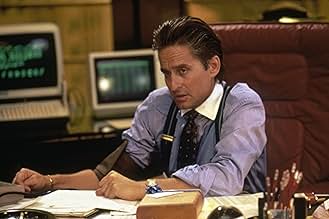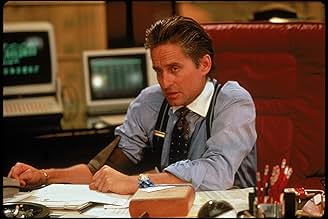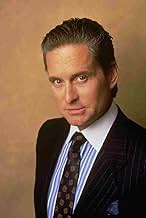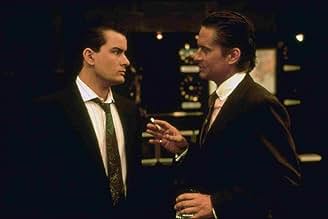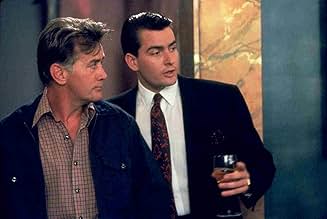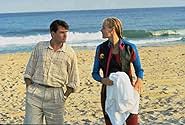An impatient young stockbroker is willing to do anything to get to the top, including trading on illegal inside information taken through a ruthless, greedy corporate raider who takes the yo... Read allAn impatient young stockbroker is willing to do anything to get to the top, including trading on illegal inside information taken through a ruthless, greedy corporate raider who takes the youth under his wing.An impatient young stockbroker is willing to do anything to get to the top, including trading on illegal inside information taken through a ruthless, greedy corporate raider who takes the youth under his wing.
- Won 1 Oscar
- 9 wins & 4 nominations total
- Chuckie
- (as Chuck Pfeifer)
- Director
- Writers
- All cast & crew
- Production, box office & more at IMDbPro
Featured reviews
Much more than a snapshot of the 80's
Many people associate this film with a liberal versus conservative viewpoint on business, a wild-west economy versus a planned economy and relegate this film to 1980's era nostalgia, like the now humorously giant cell phone Gekko is talking on as he walks along the beach. It is said that neither extreme works and that we've gradually settled towards something in the middle. However, the Gekkos of this world are smarter than that, and over the past 20 plus years they have set up an economic system that serves them well. What we now have is a situation where the haves and have-mores have a planned - almost Soviet - system in which the rules stratify them at the top. I cite the changes in bankruptcy law as exhibit A. The members of the labor force that serve them, however, are in the wild-west economy that was once advocated for everyone. Some will rise to the stratified top in this situation, but the vast majority will remain at the bottom shooting it out with each other - for scarce good jobs, good health care, education, etc. Thus, to me, Wall Street is just an opening chapter in the saga of how economic forces and attitudes toward them have changed, not the portrait of a 25 year-old fad that has come and gone.
Hard Hitting and Inspirational
I love the anxious, terrifyingly rapid advance given to the young Bud Fox from a chance comment in Gekkos daunting office, the instant changes of mood by Micheal swinging from interviewing to lambasting an industry peer on the phone and back to interviewing without a flicker.
Inspirational in the 'no fear' modus operandi of Gordon and then Bud, almost 'you can do anything if you dare' which has always given me a lift when I watch it.
Lush settings, and marvellous counterpointing performance of Terence Stamp, illustrating the 'Gekko' figure scenario in turn to Gordon nas Gordon had to Bud...
Await all Michaels movies with bated breath...Falling down....wonderful...but thats another story
Definitive portrayal of a decade
That Stone also elicits some compelling turns from a commendably straight Charlie Sheen, RETURN OF THE LIVING DEAD'S James Karen as a delightfully weaselly boss and Terence Stamp just adds to the fun. A decent story, well told and acted by a cast of professionals.
Do the Wall Street Shuffle...
It will have to go some though to beat the shock and awe value of its prototype, with Douglas' larger than life personification of corporate greed, Gordon Gekko, dominating proceedings. Charlie Sheen is the young trader on the make, aiming to aspire, or so he thinks, to Gekko's status and success, trying so hard to please his idol that he not only ends up aping his appearance (slicked back hair, big suspender braces) but even betraying his idealistic union-man father by relaying insider knowledge on the latter's ailing airline employer to Gekko who then moves in to welsh on his workforce-friendly words to asset strip the company for massive personal gain. Sheen's Bud Fox character eventually has an epiphany, augured by the coincidence of real-life and cinema dad Martin copping a heart attack and turns on and indeed turns in his guru to the authorities to bring ultimate closure to the piece.
The film has its faults; I didn't quite buy into Douglas surrogate-father figure appeal to Sheen Jr., the coincidental heart attack of Sheen/Fox Sr is a bit too pat and some of the supporting characters come on like mere ciphers, including Terence Stamp as the UK magnate-cum-nemesis of Gekko and Daryl Hannah as a Gekko cast-off girlfriend/groupie who becomes young Sheen's trophy girl-friend. This leads to a larger criticism on the paucity of female characters in the film at all, but if you can accept that this is a man's man's man's world, to paraphrase James Brown, then this morality tale of its time still packs a punch, especially with the collapse of Communism and the surrender of the likes of Russia, China et. al to the addictive drug of big-bucks capitalism.
Stone's camera is constantly on the move, capturing the frenetic-ism of dealers on the trading floor as market frenzy takes hold, with the dialogue razor-sharp throughout, so many of the phrases of course having become clichés for that era, almost entering common parlance the language, such as greed is good, lunch is for wimps and more.
In the end, young Sheen would have done well to be careful what he wished for, but if he's the Little Red Riding Hood to Douglas' Big Bad Wolf, this particular out-sized fairy tale reaches its conclusion fittingly and satisfyingly, opening up a seamy, selfish world that you know is out there still, now more than ever.
Oh That Wild and Crazy 1980s Yuppie Culture.
Did you know
- TriviaIn the scene in which Bud Fox brings a birthday gift to Gekko's office, Gordon's secretary says 'Five minutes' in order to keep the unplanned meeting between Gekko and Fox as brief as possible. There are exactly 5 minutes in the movie from this moment to the moment in which Bud leaves the office.
- GoofsAt the beginning of the movie, Bud Fox and Marvin say Gordon Gekko was shorting NASA stock right after the Challenger explosion. The scene is set in May 1985, but the Space Shuttle Challenger exploded January 28, 1986.
- Quotes
Gordon Gekko: The richest one percent of this country owns half our country's wealth, five trillion dollars. One third of that comes from hard work, two thirds comes from inheritance, interest on interest accumulating to widows and idiot sons and what I do, stock and real estate speculation. It's bullshit. You got ninety percent of the American public out there with little or no net worth. I create nothing. I own. We make the rules, pal. The news, war, peace, famine, upheaval, the price per paper clip. We pick that rabbit out of the hat while everybody sits out there wondering how the hell we did it. Now you're not naive enough to think we're living in a democracy, are you buddy? It's the free market. And you're a part of it. You've got that killer instinct. Stick around pal, I've still got a lot to teach you.
- Crazy creditsBuilding illustrations are shown during entire end credits
- Alternate versionsIn the VHS release, instead of the correct 1981-1994 20th Century Fox logo, the 1953-1981 logo is used.
- ConnectionsFeatured in Siskel & Ebert: The Duxorcist/Walker/Manon of the Spring/The Dead (1987)
- SoundtracksFly Me to the Moon
Words and Music by Bart Howard (ASCAP)
Published by The Hampshire House Publishing Corp. (ASCAP)
Performed by Frank Sinatra
Courtesy of Reprise Records
By Arrangement with Warner Special Products
Arrangement by Quincy Jones (uncredited)
Details
- Release date
- Country of origin
- Official site
- Language
- Also known as
- El poder y la avaricia
- Filming locations
- 60 W. 75th St, New York City, New York, USA(Bud's first apartment building)
- Production companies
- See more company credits at IMDbPro
Box office
- Budget
- $15,000,000 (estimated)
- Gross US & Canada
- $43,848,069
- Opening weekend US & Canada
- $4,104,611
- Dec 13, 1987
- Gross worldwide
- $43,848,069
- Runtime
- 2h 6m(126 min)
- Color
- Sound mix
- Aspect ratio
- 1.85 : 1




